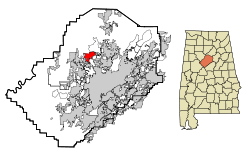Brookside, Alabama
| Brookside, Alabama | |
|---|---|
| Town | |
 Location in Jefferson County and the state of Alabama |
|
| Coordinates: 33°37′54″N 86°54′47″W / 33.63167°N 86.91306°W | |
| Country | United States |
| State | Alabama |
| County | Jefferson |
| Area | |
| • Total | 6 sq mi (15.5 km2) |
| • Land | 6 sq mi (15.5 km2) |
| • Water | 0 sq mi (0 km2) |
| Elevation | 361 ft (110 m) |
| Population (2013) | |
| • Total | 1,343 |
| • Density | 232.2/sq mi (89.9/km2) |
| Time zone | Central (CST) (UTC-6) |
| • Summer (DST) | CDT (UTC-5) |
| ZIP code | 35036 |
| Area code(s) | 205 |
| FIPS code | 01-09736 |
| GNIS feature ID | 0114968 |
| Website | http://www.brooksidealabama.com/ |
Brookside is a former mining town, predominantly settled by Eastern European immigrants, located in north-central Jefferson County, Alabama, United States. As of the 2010 census, the population of the town was 1,363. The mayor is Roger McCondiche.
The Brookside mine was opened in 1886 by the Coalburg Coal and Coke Company. It was purchased one year later by the Sloss Iron and Steel Company as a source of fuel for their blast furnaces in Birmingham. Following the practice of the time, the mined coal was processed into coke in rows of beehive ovens banked into the hillside below the mine opening. In 1897 a Robinson-Ramsey Coal Washer was installed, increasing the efficiency of coke burning and therefore the overall efficiency of the mine. Other advanced equipment was also installed at Brookside, placing it at the forefront of mining technology in the Birmingham District at the turn of the century.
Brookside served as the headquarters for four Sloss-owned mines in the immediate area (Cardiff, Coalburg, Brazil and Brookside). Because the capacity of Brookside's processing equipment exceeded the mine output, some of the slack from the Brazil mine was brought to Brookside for washing and coking.
Brookside was incorporated in 1898. The descriptive name Brookside stems from the Five-Mile creek that flows through the town.
Sloss, like other employers in the booming industrial expansion of the early 20th century, had difficulty recruiting skilled labor. Recruitment efforts extended internationally and Brookside became the home of many Czechoslovakian immigrants and their families who made their way to the mines. As Brookside became a destination for Eastern European miners in the area, the culture of the town reflected their ethnic traditions. A Russian Orthodox church was founded and served to strengthen community ties. This church was one of the first Russian Orthodox churches built south of the Mason-Dixon. Unlike other mines where skilled whites and unskilled blacks could be played against each other by the owners, the Brookside miners were tightly organized and carried out a successful (albeit violent) strike in 1906.
...
Wikipedia
